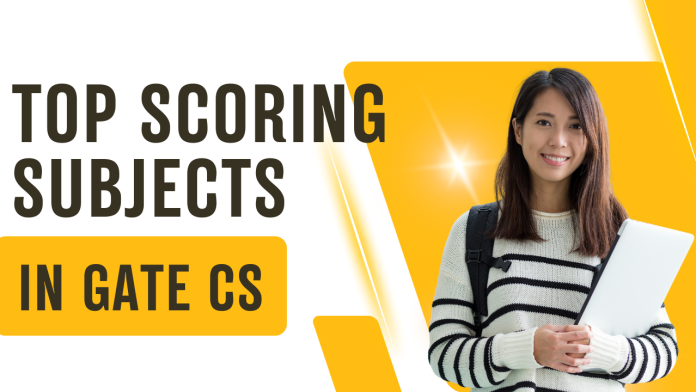Top Scoring Subjects in GATE CS
Top Scoring Subjects in GATE CS, The GATE (Graduate Aptitude Test in Engineering) exam for Computer Science (CS) is one of the most competitive exams for engineering graduates. Every mark matters — and understanding which subjects yield the highest scores can help you study smart, not just hard.
In this blog, we’ll explore the most scoring subjects in GATE CS, practical strategies to master them, and how Gate@Zeal provides the perfect blend of conceptual clarity, mock tests, and personalized mentoring to help you achieve your dream rank.
Understanding the GATE CS Pattern
Before diving into the subjects, it’s essential to understand why some topics are considered more “scoring” than others in the GATE CS exam. The total marks for the GATE paper are 100, divided into two main sections — General Aptitude (15 marks) and Core Computer Science subjects (85 marks).
The exam includes different question types such as Multiple Choice Questions (MCQs), Multiple Select Questions (MSQs), and Numerical Answer Type (NAT) questions. Each question type tests a different skill — from theoretical understanding to problem-solving accuracy.
To score high, aspirants should focus on key areas like strong conceptual understanding, logical reasoning, problem-solving efficiency, and effective time management. Subjects that combine conceptual clarity with practice-based problem-solving often turn out to be the most scoring ones in GATE CS.
Some subjects naturally yield higher accuracy rates and more predictable question patterns, which is why toppers focus on mastering them first — then build on weaker zones gradually.
Top Scoring Subjects in GATE CS (Computer Science)
1. Data Structures & Algorithms (DSA)
Weightage: 10–12 marks
One of the most important and consistent scoring subjects in GATE CS. Questions are based on logic, implementation, and time complexity.
Key Topics:
- Arrays, Linked Lists, Stacks, Queues
- Trees, Graphs, Heaps
- Searching and Sorting algorithms
- Dynamic Programming, Greedy Algorithms
How to Master:
- Practice at least 50+ problems from each data structure type.
- Revise algorithm complexities regularly.
- Attempt Gate@Zeal’s topic-wise test series to build speed and accuracy.
- Attend Zeal’s live lectures where concepts are taught with GATE-level examples and visualization.
2. Computer Networks
Weightage: 8–10 marks
A high-yield subject with mostly conceptual and formula-based questions.
Key Topics:
- OSI & TCP/IP Models
- IP Addressing, Subnetting
- Congestion Control
- Protocols (TCP, UDP, ARP, ICMP, DNS, HTTP)
- Data Link Layer (CSMA/CD, ALOHA, CRC)
How to Master:
- Make short notes of formulas and flow mechanisms.
- Watch Gate@Zeal’s animated explanations of protocols — it simplifies tough topics like TCP and subnetting.
- Solve at least 10–15 full-length numerical problems per subtopic.
3. Operating Systems (OS)
Weightage: 8–10 marks
OS is a mix of conceptual and numerical questions — scheduling, memory management, and concurrency are key.
Key Topics:
- Process Scheduling (FCFS, SJF, RR, Priority)
- Deadlocks
- Memory Management (Paging, Segmentation)
- Synchronization (Semaphores, Monitors)
How to Master:
To truly master Operating Systems (OS) for GATE CS, consistent practice and conceptual clarity are key. Begin by solving numerical problems on crucial topics like CPU scheduling algorithms and page replacement techniques every day — this builds speed and familiarity with the question patterns.
Make use of Gate@Zeal’s Test Series that offers Topic-wise Analytics, allowing you to monitor your accuracy and progress over time. This helps you identify weak areas early and refine your approach with data-driven insights.
Additionally, pay special attention to concurrency concepts such as deadlocks, synchronization, and semaphores — these topics often contain subtle conceptual traps that can confuse even well-prepared students. Strengthening these areas will not only improve accuracy but also boost overall confidence in tackling OS questions during the GATE exam.
4. Theory of Computation (TOC)
Weightage: 7–9 marks
TOC is considered challenging, but with a strong conceptual base, it becomes one of the most scoring.
Key Topics:
- Regular Expressions & Finite Automata
- Pushdown Automata
- Turing Machines
- Decidability, Undecidability
How to Master:
To excel in Theory of Computation (TOC), it’s important to focus on conceptual visualization rather than rote learning. Instead of merely memorizing state transitions or automata rules, try to visualize how automata work — imagine how input strings move through different states. This mental imagery helps in understanding patterns and solving tricky questions with ease.
Take advantage of Gate@Zeal’s concept videos, which break down complex and abstract TOC concepts through step-by-step animated examples. These visuals make topics like DFA, NFA, regular expressions, and Turing machines much easier to grasp and remember.
5. Databases (DBMS)
Weightage: 6–8 marks
DBMS is a favorite for students aiming for quick and accurate marks.
Key Topics:
- ER Models, Normalization
- SQL Queries
- Transactions, Concurrency Control
- Indexing, File Structures
How to Master:
To master Database Management Systems (DBMS) for GATE CS, focus on developing strong problem-solving and application skills. Start by solving SQL query-based questions from the past 10 years of GATE papers — this helps you understand how queries are framed and how concepts like joins, subqueries, and aggregate functions are tested in the exam.
Next, revise normalization rules and functional dependencies using concise, well-organized short notes. These topics are concept-heavy but frequently asked, so having a clear revision summary can save valuable time during final preparation.
6. Digital Logic & Computer Organization
Weightage: 8–10 marks
A blend of numerical and conceptual questions, perfect for boosting scores quickly.
Key Topics:
- Boolean Algebra, K-maps
- Number Systems, Logic Gates
- Pipelining, Cache Memory, Instruction Set Architecture
How to Master:
To master Computer Organization and Architecture (COA), consistency and clarity in fundamentals are essential. Begin by practicing truth table simplifications daily, as they strengthen your understanding of logic design — the foundation for many COA topics. Regular practice helps you visualize circuit behavior and quickly solve logic-based numerical problems.
Take advantage of Gate@Zeal’s problem-solving sessions, which emphasize time optimization strategies for lengthy and calculation-heavy COA questions. These sessions guide you on how to approach pipeline, memory hierarchy, and instruction set problems efficiently under exam pressure.
7. Programming & Discrete Mathematics
Weightage: 10–12 marks combined
The backbone of problem-solving in GATE CS. Questions test logic, sets, combinatorics, and graph theory.
Key Topics:
- Sets, Relations, Functions
- Propositional Logic
- Graphs, Trees, Combinatorics
- C/Java-based logical questions
How to Master:
To excel in Discrete Mathematics and Probability for GATE CS, it’s crucial to strengthen both conceptual understanding and problem-solving skills. Start by practicing Gate@Zeal’s Daily Practice Questions (DPQs), which are designed to enhance your logical reasoning, analytical thinking, and numerical problem-solving abilities. Regular practice ensures that you become quick and accurate in tackling a variety of question types.
Create a formula sheet for combinatorics and probability, including key concepts like permutations, combinations, conditional probability, Bayes’ theorem, and expected value. Having a concise reference sheet makes last-minute revision faster and reduces the chances of forgetting critical formulas during the exam.
8. General Aptitude (Verbal + Quantitative)
Weightage: 15 marks
Every student can score here with consistent practice.
How to Master:
To excel in General Aptitude (GA) for GATE CS, consistent daily practice is essential. Dedicate at least 30 minutes every day to solve aptitude questions, covering topics like quantitative ability, logical reasoning, and data interpretation. Even a small daily commitment can significantly improve speed and accuracy over time.
Leverage Gate@Zeal’s Aptitude Crash Course, which provides shortcuts, tricks, and problem-solving techniques to tackle common GA questions efficiently. These strategies help reduce calculation time and simplify complex problems, making them easier to solve under exam conditions.
While practicing, prioritize speed and accuracy over complexity. GA questions are designed to test logical thinking and quick calculations, not deep theoretical knowledge. By focusing on efficient problem-solving techniques and regular practice, you can maximize your score in this high-yield section.
Smart Strategy to Master Scoring Subjects
| Phase | Study Focus | Gate@Zeal Approach |
| Month 1–2 | Core Concept Building (DSA, TOC, OS) | Attend foundation lectures and create handwritten notes |
| Month 3–4 | Strengthen Numericals (CN, COA, DBMS) | Take topic-wise mini-tests from Gate@Zeal’s online series |
| Month 5–6 | Mock Tests & Revision | Use Gate@Zeal’s full-length mock tests and video analysis tools |
| Last Month | Final Revisions | Revise short notes + attend live doubt sessions from Zeal mentors |
Why Choose Gate@Zeal for GATE CS Preparation
When it comes to mastering the most scoring subjects, quality guidance and structured practice matter more than anything.
Here’s why Gate@Zeal stands out:
Subject-Wise Expert Faculty – Every subject (like TOC, DSA, CN) is handled by domain experts with GATE AIR toppers’ experience.
Complete Test Series – Includes topic-wise, sectional, and full-length tests with real GATE interface simulation.
Detailed Performance Analytics – Compare your progress with top students and get personalized improvement suggestions.
Video Solutions & Doubt Sessions – Every test comes with step-by-step video solutions by Zeal faculty.
Proven Results – Hundreds of students have cracked GATE CS with top ranks through Gate@Zeal’s structured learning system. Visit gateatzeal.com to explore test series, lectures, and mentorship plans for GATE CS 2025.
Final Thoughts
Mastering GATE CS isn’t about studying everything — it’s about focusing on the right subjects with the right strategy.
By prioritizing the top scoring subjects like DSA, CN, OS, TOC, and DBMS — and combining that with smart analysis from Gate@Zeal’s test series, you can secure a top rank with confidence.
Remember:
“You don’t need to be the fastest; you just need to be consistent, accurate, and well-prepared — that’s what Gate@Zeal trains you for.”
FAQs
1. Which subjects are easiest to score in GATE CS?
Subjects like Discrete Mathematics, Digital Logic, and Programming & Data Structures are highly scoring.
2. Which GATE CS subject has the highest weightage?
Algorithms, Computer Networks, and Operating Systems usually have the most weightage.
3. Can I score well by focusing on a few subjects?
Yes, but you should cover high-weightage topics thoroughly for a strong overall score.
4. Is aptitude important in GATE CS?
Yes, General Aptitude carries 15 marks and can boost your total score easily.
5. Which subjects should beginners start with?
Start with Discrete Mathematics and C Programming, as they build strong fundamentals.
6. Do scoring subjects change every year?
Not much — core subjects like CN, DBMS, and OS remain consistently important.
7. How can I identify my strong subjects?
Take mock tests and analyze performance to find topics where you score the most.
8. Can focusing on top subjects guarantee a good rank?
It helps a lot, but combine it with concept clarity and revision for the best results.
Explore more from our blogs:
How to follow GATE test Series | GATE Preparation
Top 5 Smart Revision Strategies for GATE | Aspirant Should Follow








